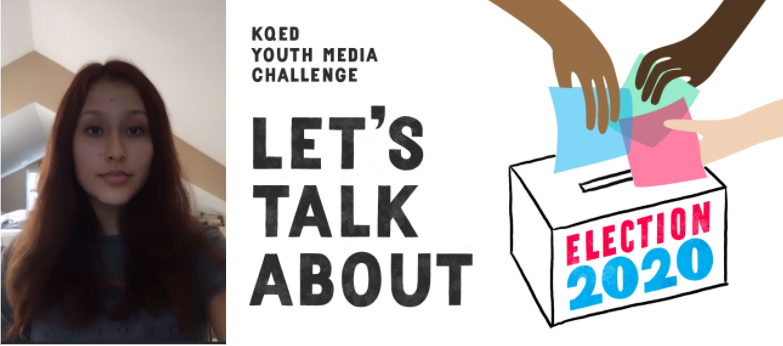Living in the year 2020 was like living in a dystopian society, one in which social and environmental injustices reigned supreme. Being in a world engulfed in so much darkness it’s hard to see the light, or in the case of my generation, be that light of hope for the future. My name is Gabriella Garcia, and through my internship at the California Academy of Sciences my peers and I were able to advocate for an issue we believe in through the KQED Let’s Talk about Election 2020 Youth Media Challenge. The internship that I am a part of is the Careers in Science internship program, which is a multi-year, year-round program that offers amazing opportunities for youth that come from underrepresented communities in San Francisco to immerse themselves in STEM fields.
A component of the program is Special Interest Groups (SIGs): project-based teams of interns that focus on environmental civic engagement. After hearing about the KQED Let’s Talk About Election 2020 challenge, my Special Interest Group was eager to participate in this challenge to spread awareness of current issues in our world that we feel personally connected to. Overall, my SIG chose to take part in this KQED challenge to make a positive impact in our communities, hoping that our voices and use of digital media can reach the masses so we could all start to take the necessary steps to strive for a brighter future.
The idea that my voice will forever echo in the vast veins of the web seemed so powerful to me.
The idea of creating a video for my peers was entrancing to me, as so many ideas flowed in my head as to what I can advocate for, and the idea that my voice will forever echo in the vast veins of the web seemed so powerful to me. Although I had many ideas of what to do, say, and portray on video, I was in dire need of guidance on how I could create a powerful and focused video. This is why at the beginning, my CiS manager, Leah Kalish, and KQED’s Program Manager, Ilana Somasunderam, offered the interns and me tips on how to find reliable sources, how to create an impactful and high-quality video through image composition, and one’s tone of voice. In addition to this advice, Leah and Ilana offered us counsel on how to write a persuasive and compelling script, and how to use digital media such as Adobe Spark.
After gaining this strong foundation in knowledge, two groups of three were formed, in which a member of the Leadership Council (LC) of interns would lead each group. My team member was Jordan Huang, and our LC leader was Xaria Lubensky. At first, we began to brainstorm issues that we wanted to raise awareness for, and issues we felt personally connected to. In the beginning, my group and I were passionate about advocating for two issues: racism and environmental justice. From these two imminent issues in our societies, my group and I went back and forth putting out ideas on what subthemes to advocate for. Our subthemes ranged from food deserts in San Francisco, lack of natural spaces in SF communities with a majority of BIPOC residents, and the California wildfires. After many discussions, my group’s shared worry over the apocalyptic orange-skies that fell over the San Francisco skies on September 9, led us to spread awareness on the California fires and how to avoid man-made fires. From there, the more knowledge my team and I accumulated, the richer our script grew, and the more organized our plan for the video became. Our video touches on how society can prevent wildfires by making more eco-friendly habits and choices, and how forming these habits, as a result, can help combat climate change.
Thanks to this challenge, I felt that my voice mattered and that it’s going to be heard.
Ultimately, being a part of this challenge allowed me to grow as an advocate, a professional, and an individual. The year 2020 confined us all in one place, unheard, detached, and severed from the world. However, thanks to this challenge I was able to form amazing connections with my fellow interns despite being in a remote environment. Artistically, my abilities expanded as I learned how to use digital media, and how to order, compile and compose images, video, and sound to create a powerful video. Thanks to this challenge, I felt that my voice mattered and that it’s going to be heard. Conclusively, in taking part in this challenge I was able to expand my knowledge of the world, I was able to educate those around me, and I was able to reflect on what I can do to change my actions in order to evolve and help protect our planet.
